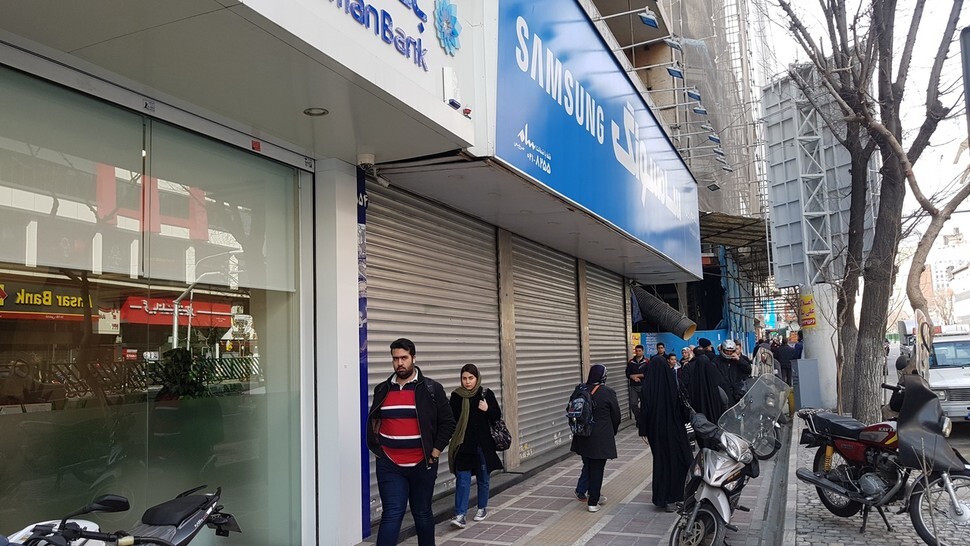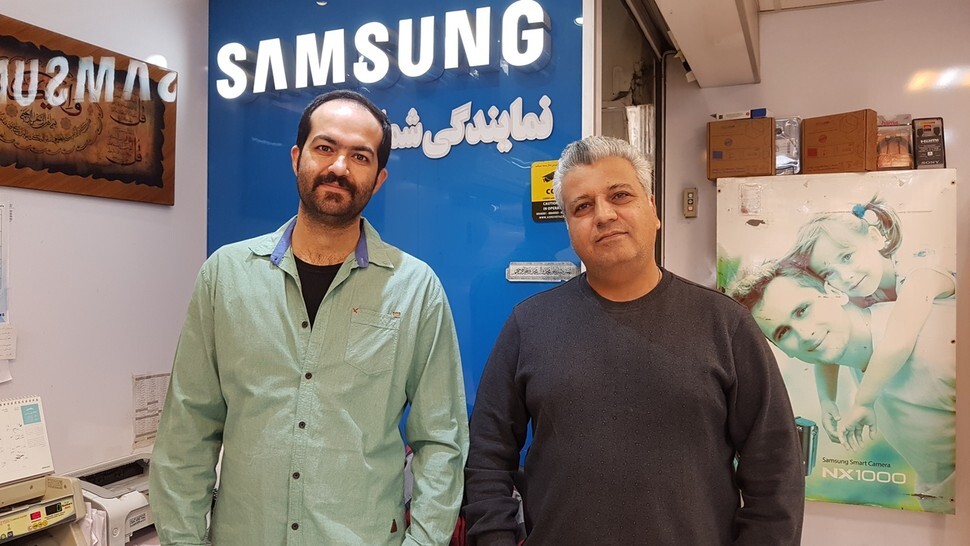hankyoreh
Links to other country sites 다른 나라 사이트 링크
[Reportage] Iranian vendors of S. Korean products shutting down due to lack of supplies

On Feb. 19, a large number of the electronics shops lining Valisar Street in Tehran, Iran, were closed. Until recently, these shops had been selling refrigerators and televisions manufactured by Samsung and LG. But the shops can’t acquire those products any longer, forcing them to draw down their shutters, one after another. The few that remain open say they’re eking out a living on the products still in stock.
“We’re keeping the doors open because we still have some products in stock. But even that will run out in three or four months,” said Alireza, manager of a store that has been selling Samsung products for 30 years.
South Korean companies are being pushed out of Iran, the country whose 80 million people represent the largest market in the Middle East. Since the US scrapped its nuclear deal with Iran and toughened sanctions, South Korean companies have suffered the fallout. Two of the leading examples are Samsung and LG, which had enjoyed major success in the country’s electronics market. These companies had been assembling their products inside Iran, but the ban on all imports, exports, and financial transactions that the US imposed on Iran this past September has made it impossible for them to bring in key components. At the end of 2019, Samsung ultimately had to suspend production.
Samsung and LG’s electronic products have been immensely popular in Iran over the past 10 years. “Several decades ago, European products were all the rage, and a little over a decade ago, Sony was hot stuff. Since then, South Korean brands have been number one,” Alireza said. “Iranian vendors and workers played a big role in pushing South Korean electronic goods to the top of the Iranian market.” In effect, the edifice these companies had spent so long building with the Iranians has suddenly been knocked to the ground.

Chinese companies rush in to fill void left by S. Korean firms
Chinese companies such as Huawei have been jumping in to occupy the vacancy left by the South Korean firms. After Iran began stressing a “resistance economy” against American sanctions, Samsung and LG’s Iranian suppliers have started building their own independent brands. SAM, an Iranian firm that was working with Samsung, has begun selling products under its own trademark — there’s a refrigerator marked “SAM” at Alireza’s store. The majority of the parts come from China.
European and Japanese companies are also leaving Iran, but South Korean companies have faced the brunt of the Iranian government’s criticism. During an appearance on Iran’s state-run Press TV on Feb. 18, Mohammad Jafar Na’nakar, head of the legal department at Iran’s Ministry of Information and Communications Technology, said that Iran could refuse Samsung executives entry to the country or block Samsung smartphones from its mobile networks. Na’nakar was responding to Samsung’s announcement on Feb. 10 that it was suspending in-app transactions after American sanctions made it impossible to conduct transactions using the Iranian currency, called the rial.
On Feb. 16, Iranian Foreign Ministry Spokesman Seyyed Abbas Mousavi posted a picture on Twitter showing a Samsung sign being taken down in front of a store. “Some companies have left Iran because of bullying from the US. They need to know that it won’t be easy to return,” Mousavi wrote in Korean and Iranian.
South Korean companies maintained their position in the Iranian market despite high tensions between the US and Iran over the nuclear issue, achieving rapid growth in the automobile, electronics, cosmetics, and food markets. But that growth has been stymied by the Trump administration, which has toughened sanctions against Iran twice since 2018. Particularly painful is the “secondary boycott,” which bans companies doing business with Iran from doing business with American companies. Since the US is a crucial trading partner for South Korean companies, such sanctions force them to abandon the Iranian market.
The situation has been made even worse by South Korea’s decision to send troops to the Strait of Hormuz at the US’ request. South Korea attempted to mitigate the Iranian backlash by not joining an American-led naval coalition. But in remarks made shortly after South Korea’s announcement, Mousavi made Iran’s displeasure clear: “If [South Korea] isn’t even fully aware of the historical nomenclature of the Persian Gulf, what knowledge or legitimacy could lie behind its deployment of military forces to the region?”
Iranians frustrated that S. Korea is so subservient to USIranians have been avid consumers of South Korean TV shows and have been well-disposed to Koreans, but that warmth is starting to fade. “I was so angered by the news that Korean companies were pulling out of Iran that I got a new TV. Korea is a country with a sophisticated culture and a long history, so why is it so subservient to the US?” said Kamal Taheri, who runs a public relations firm.
Some say that the South Korean government hasn’t done enough to maintain relations with Iran while focusing entirely on relations with the US because of the ongoing defense cost-sharing negotiations and its efforts to improve inter-Korean relations. One such person is Yu Dal-seung, a professor at the Hankuk University of Foreign Studies, who has been lecturing and researching at a university in Tehran since last year.
“In Iranian culture, results aren’t as important as the process of building trust. Compared to Japan’s constant high-level diplomacy, South Korea gives the Iranians the impression that it’s not as attentive and only cares about the US. Since Iran’s distrust and disappointment have increased, South Korea needs to aggressively engage in high-level diplomacy to ensure that its relationship with Iran doesn’t get any worse,” Yu said.
Amid tougher sanctions from the US, South Korea completely halted imports of Iranian crude oil in May 2019 and then closed the won-denominated payment account, which had been the last lifeline for trade between the two countries, in September. Between January and November of last year, South Korea’s exports to Iran plunged to US$260 million, down 88.6%from the same period in 2018.
Since the end of last year, the Iranian government has demanded that South Korea pay cough up the 7 trillion won (US$5.83 billion) deposited in the won-denominated account as payment for Iranian crude oil and condensate. With the US refusing to grant an exception to the sanctions, South Korea hasn’t managed to figure out how to transfer this money.
“The US ought to support South Korea’s request for a sanctions waiver for using the won-denominated payment account to provide humanitarian supplies to Iran so that South Korean companies can continue doing business there,” said Yu Jeong-hyeon, South Korea’s ambassador to Iran.
By Park Min-hee, senior staff writer
Please direct comments or questions to [english@hani.co.kr]

Editorial・opinion
![[Column] The state is back — but is it in business? [Column] The state is back — but is it in business?](https://flexible.img.hani.co.kr/flexible/normal/500/300/imgdb/original/2024/0506/8217149564092725.jpg) [Column] The state is back — but is it in business?
[Column] The state is back — but is it in business?![[Column] Life on our Trisolaris [Column] Life on our Trisolaris](https://flexible.img.hani.co.kr/flexible/normal/500/300/imgdb/original/2024/0505/4817148682278544.jpg) [Column] Life on our Trisolaris
[Column] Life on our Trisolaris- [Editorial] Penalties for airing allegations against Korea’s first lady endanger free press
- [Editorial] Yoon must halt procurement of SM-3 interceptor missiles
- [Guest essay] Maybe Korea’s rapid population decline is an opportunity, not a crisis
- [Column] Can Yoon steer diplomacy with Russia, China back on track?
- [Column] Season 2 of special prosecutor probe may be coming to Korea soon
- [Column] Park Geun-hye déjà vu in Yoon Suk-yeol
- [Editorial] New weight of N. Korea’s nuclear threats makes dialogue all the more urgent
- [Guest essay] The real reason Korea’s new right wants to dub Rhee a founding father
Most viewed articles
- 1[Column] Why Korea’s hard right is fated to lose
- 2Amid US-China clash, Korea must remember its failures in the 19th century, advises scholar
- 3[Column] The state is back — but is it in business?
- 460% of young Koreans see no need to have kids after marriage
- 5AI is catching up with humans at a ‘shocking’ rate
- 6Hybe-Ador dispute shines light on pervasive issues behind K-pop’s tidy facade
- 7Japan says it’s not pressuring Naver to sell Line, but Korean insiders say otherwise
- 8S. Korean chaebols comprise 84% of GDP but only 10% of jobs
- 9[Column] Can Yoon steer diplomacy with Russia, China back on track?
- 10Gangnam murderer says he killed “because women have always ignored me”